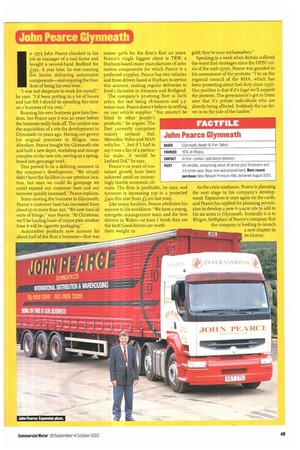n 1973 John Pearce chucked in his job as manager
Page 51

If you've noticed an error in this article please click here to report it so we can fix it.
of a coal factor and bought a second-hand Bedford for 1350. A year later, he was running five lorries delivering automotive components—and enjoying the freedom of being his own boss.
"I was just desperate to work for myself," he says. "I'd been putting in a lot of hours and just felt I should be spending this time on a business of my own."
Running his own business gave him freedom, but Pearce says it was zo years before the business really took off. The catalyst was the acquisition of a site for development in Glynneath no years ago. Having out-grown his original premises in Rhigos, near Aberdare, Pearce bought the Glynneath site and built a new depot, workshop and storage complex on the new site, serving as a springboard into groupage work.
This proved to be a defining moment in the company's development. "We simply didn't have the facilities in our previous location, but once we could do groupage we could expand our customer base and our turnover quickly increased," Pearce explains.
Since moving the business to Glynneath, Pearce's customer base has increased from about 50 to more than 250. "We now haul all sorts of things," says Pearce. "At Christmas, we'll be hauling loads of mince pies; another time it will be cigarette packaging."
Automotive products now account for about half of the firm's business—that was
nearer 90% for the firm's first 20 years. Pearce's single biggest client is TRW, a Durham-based major manufacturer of automotive components for which Pearce is a preferred supplier. Pearce has two vehicles and three drivers based at Durham to service this account, making regular deliveries to Ford's factories in Swansea and Bridgend.
The company's 50-strong fleet is 6o% artics, the rest being r8-tonners and 3.5tonne vans. Pearce doesn't believe in settling on one vehicle supplier. "You mustn't be blind to other people's products," he argues. The fleet currently comprises mainly Leyland Daf, Mercedes, Volvo and MAN vehicles, "...but if I had to say I was a fan of a particular make, it would be Leyland Daf," he says.
Pearce's io years of sustained growth have been achieved amid an increasingly hostile economic climate. The firm is profitable, he says, and turnover is increasing (up to a projected 14m this year from £3.5m last year).
Like many hauliers, Pearce attributes his success to his workforce: "We have a young, energetic management team and the best drivers in Wales—at least I think they are the best! Good drivers are worth
FOUNDED 1973, in Rhigos.
their weight in gold; they're your ambassadors."
Speaking in a week when Britain suffered the worst fuel shortages since the OPEC crisis of the mid-197os, Pearce was guarded in his assessment of the protests: "I'm on the regional council of the RHA, which has been protesting about fuel duty since 1997. Our position is that if it's legal we'll support the protests. The government's got to listen now that it's private individuals who are directly being affected. Suddenly the car driver is on the side of the haulier."
As the crisis continues, Pearce is planning the next stage in his company's development. Expansion is once again on the cards, and Pearce has applied for planning permission to develop a new 6.5-acre site to add to his six acres in Glynneath. Ironically it is to Rhigos, birthplace of Pearce's company that the company is looking to launch a new chapter in its history.












































































































